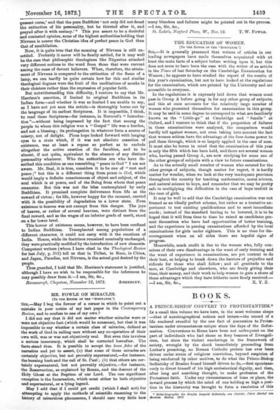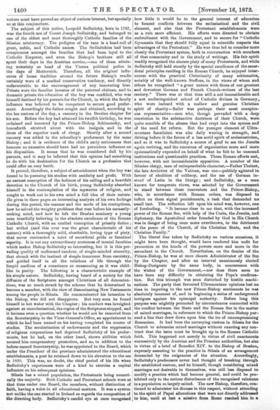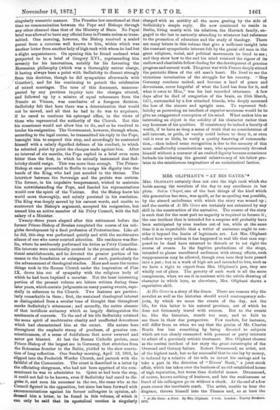BOOKS.
— that of autobiographical notices and letters—the record of a life rendered eventful by the one fact of conversion to Protes- tantism under circumstances unique since the days of the Refor- mation. Conversions to Rome have been not unfrequent on the part of individuals who had shone as fiery beacons of Evangeli- clam, but since the violent sunderings in the framework of society, wrought by the shock immediately proceeding from Luther's preaching, no Roman Catholic prelate has ever been driven under strain of religious conviction, beyond suspicion of being reinforced by other motives, to do what the Prince-Bishop Sedlnitzky of Breslau found himself driven to do,—first spontane- ously to divest himself of his high ecclesiastical dignity, and then, after long and searching thought, to make profession of the Protestant faith. Under any circumstances of time or place, the inward process by which the mind of one holding so high a posi- tion in the hierarchy was brought to form a resolution of this • Sdba-blogrophie da Graft* Leopold So:Malay von Choltla, Fara Bischof vox Breda*. Berlin. 1872
nature must have proved an object of curious interest, but specially so at this conjuncture.
The subject of this notice, Leopold Sedlnitzky, born in 1787, was the fourth Bon of Count Joseph Sedlnitzky, and belonged to one of the oldest and most thoroughly Catholic families of the Silesian aristocracy. The pedigree of his race is a bead-roll of great, noble, and Catholic names. The Sedlnitzkies had been conspicuous amongst the families that had been loyal to the Catholic Emperor, and even the Bishop's brothers still all spent their days in the Austrian service,—one of them attain- ing notoriety as head of the Vienna political police in the days of Metternich. Therefore, all the original influ- ences of home tradition around the future Bishop's cradle certainly were of a marked conservative tendency, and directly unfavourable to the encouragement of any innovating bias. Trieste were the familiar inmates of the paternal chateau, and to domestic priests the education of the boy was confided, who was himself destined by his parents for the Church, in which the family influence was believed to be competent to secure good prefer- ment. Accordingly the father sought and obtained, according to the lax custom of the day, a canonry in the Breslau chapter for his son. Before the boy had attained his twelfth birthday, he was ordained and tonsured by the Prince-Bishop Schimonsky, and henceforth strutted about with the insignia and in the dress of the superior rank of clergy. Shortly after a second canonry was added to the schoolboy's preferment by the same Bishop ; and it is evidence of the child's early seriousness that honours so excessive should have had no pernicious influence on his disposition. It seems that he was considered dull by his parents, and it may be inferred that this opinion had something to do with his destination for the Church as a profession that could offer an easy berth.
It proved, therefore, a subject of astonishment when the boy was found to be pursuing his studies with assiduity and profit. With an earnest conception of the holiness of his calling and a heartfelt devotion to the Church of his birth, young Sedlnitzky absorbed himself in the contemplation of the mysteries of religion, and sought to work out to his own mind a full idea of their nature: He gives in these pages an interesting analysis of his own feelings during this period, the manner and the mode of his coneeptions, how he solved the weighty problems that rose before his earnestly- seeking mind, and how he left the Breslau seminary a young man trustfully believing in the absolute excellence of the Roman Catholic Church, with an exalted conception of priestly duties ; but withal (and this ever was the great characteristic of his nature) with a thoroughly mild, charitable, loving type of piety, that never contracted a taint of sacerdotal pride or fanatical asperity. It is not any extraordinary acuteness of mental faculties which makes Bishop Sedlnitzky so interesting, but it is this per- vading quality of undimmed candour, of single-minded sincerity, that shrank with the instinct of simple innocence from casuistry, and guided itself in all the relations of life through the limpid medium of a conscience as unassuming as it was child- like in purity. The following is a characteristic example of his simple nature. Sedlnitzky, having heard of a society for the diffusion of the Scriptures amongst Christians of all denomina- tions, was so much struck by the scheme that he determined to become a member, with the view of disseminating New Testaments among the people in Silesia. He communicated his intention to the Bishop, who did not disapprove. But very soon he found himself in hot water with the Chapter ; his conduct was inveighed against as uneccledastical, the copies of the Scriptures stopped, and it became even a question whether he would not be removed from the Secretaryship to the Vicar-General's Office, an appointment to which he had been named on his having completed his course of studies. The secularisation of endowments and the suppression of religions corporations had deprived Sedlnitzky of his prefer- ments, but he had, on the other hand, shown abilities which secured him compensatory promotion, and so, in addition to the before-named Secretaryship, he was appointed to the Board, which under the President of the province administered the educational establishments, a post he retained down to his elevation to the see in 1830. This was, no doubt, the chief period of his life when Sedlnitzky's experiences were of a kind to exercise a capital influence on his subsequent opinions.
Silesia has a mixed population, the Protestants being numeri- cally the majority. Both Catholic and Protestant schools were at that time under one Board, the members, without distinction of faith, having a voice in all educational matters. It was a system not unlike the one started in Ireland as regards the composition of the directing body. Sedlnitzky's candid eye at once recognised how little it would be to the general interest of education to foment conflicts between the ecclesiastical and the civiL element, and also that the Protestant establishments were as a rule more efficient. His efforts were directed to obviate embroilment with the Government, and to secure for "Catholic. Gymnasia that they should fully equal in scientific respects the. advantages of the Protestant." He was thus led to consider more closely the Protestant system, both in conversation with members. of that community and in the study of writings. His fair spirit readily recognised the sincere piety of many Protestants, and while Sedlnitzky still held stoutly by the special excellence of the sacer- dotal principles residing in the Roman Church, he enjoyed inter- course with the practical Christianity of many schismatics, notably of the well-known Steffens, in the views of whom and others he recognised "a great unison with those of our greatest and devoutest German and French Church-writers of the last century." There was at that time still a not inconsiderable and. a not undistinguished school of Catholic divines in Germany,. who were imbued with a mellow and genuine Christian spirit of charity—Sailer was perhaps their most conspicu- ous representative—men who, though pervaded with a deep conviction in the substantive doctrines of their Church, were. quite sensible of the abuses that had crept into the system and of the need for reform. But the younger element of Ultra- montane fanaticism was also daily waxing in strength, and driving before it the forces of a less acrid spirit of ecclesiasticism„ and so it was to Sedlnitzky a source of grief to see the Jesuits. again reviving, and the resources of organisation more and more. systematically expended on behalf of what he 'felt to be unsound. institutions and questionable practices. These Roman efforts met„ however, with not inconsiderable opposition. A number of the Silesian clergy, men of unimpeachable character,—Father Theiner, the late Archivist of the Vatican, was one—publicly agitated in_ favour of abolition of celibacy, and the use of German in- stead of Latin in the liturgy ; and Sedlnitzky, as a man. known for temperate views, was selected by the Government to stand between these innovators and the Prince-Bishop„ who, in accordance with Roman orders, was disposed to inflict on them signal punishments, a task that demanded no small tact. The reflection left upon his mind was, however, one of foreboding. "It became clear to me that, with the increased power of the Roman See, with help of the Curia, the Jesuits, and diplomacy, the Apostolical order founded by God in His Church was in danger of being once more overthrown, to the detriment of the peace of the Church, of the Christian State, and the. Christian Family."
The liberal line taken by Sedlnitzky on various occasions, it might have been thought, would have rendered him unfit for promotion at the hands of the powers more and more in the ascendant in the Church. Nevertheless, on the demise of the Prince-Bishop, he was at once chosen Administrator of the See by the Chapter, and after an interval unanimously elected Bishop-Designate by the same body, in concurrence with the wishes of the Government,—nor does there seem to have been any difficulty in obtaining the Pope's confirma- tion. But this triumph was soon disturbed by hostile machi- nations. The party that favoured Ultramontane opinions lost no time in imputing to the new Prince-Bishop sentiments he was absolutely innocent of, and in beginning a series of underground intrigues against his episcopal authority. Before long this purpose was mightily promoted by circumstances connected with. the conflict between the State and the Roman See in the matter of mixed marriages, in reference to which the Prince-Bishop pur- sued a line that drew down upon him the ire of uncompromising Romanism. It had been the unvarying custom in Silesia for the- Church to solemnise mixed marriages without exacting any con- tract that the issue must be brought up in the Roman Catholics faith. This happened not merely in virtue of civil enactments- successively by the Austrian and the Prussian authorities, but also. in virtue of a brief of Benedict XIV. to the Bishop of Breslau, expressly assenting-to the practice in Silesia of an arrangement demanded by the exigencies of the situation. Accordingly, Sedlnitzky's predecessor never had thought of breaking through the established custom, and he himself, though considering mixed marriages not desirable in themselves, was still less disposed to. modify a practice which had become general, and could be pro- hibited only to the serious disturbance of the recognised relations in a population so largely mixed. The new Bishop, therefore, con- tinued to administer his diocese in this respect, without attending to the spirit of Papal allocutions that were not directly addressed to him, until at last a missive from Home reached him in a
singularly eccentric manner. The Prussian law sanctioned at that time no communication between the Pope and Bishops through any other channel than that of the Ministry of State. No Papal brief was allowed to have any official force in Prussia unless so trans- mitted. One morning, however, the Bishop received a sealed parcel from a countess well known to him, within which was another letter from another lady of high rank with whom he had but a slight acquaintance. On opening this he found enclosed what purported to be a brief of Gregory XVL, reprimanding him severely for his innovations, notably for his favouring the
Hermesian philosophy (which was a thoroughly untrue charge, it having always been a point with Sedlnitzky to dissent strongly
from this doctrine, though he did sympathise afterwards with Giinther), and for his continuing to permit the celebration of mixed marriages. The tone of this document, unaccom- panied by any previous inquiry into the charges uttered, and followed up by a missive of equal vehemence from the Nuncio at Vienna, was conclusive of a foregone decision. Sedlnitzky felt that here there was a determination that would not be moved, and all that he had to do was to acquiesce, if he cared to continue his episcopal office, in the views of those who represented the authority of the Church. But this his conscience would not allow him to do, and so he resolved to tender his resignation. The Government, however, through whom, according to the legal course, he transmitted his reply to the Pope, besought him to suspend this step, and accordingly he contented himself with a calmly dignified defence of his conduct, in which he rebutted point by point the charges made against him. After an interval of six months, the Pope replied in a brief even more bitter than the first, in which he actually insinuated that Sed- lnitzky should resign. This was more than enough. The Prince- Bishop at once proceeded to Berlin to resign his dignity into the hands of the King, who had just acceded to the throne. The interview between the Sovereign and the prelate was curious. The former, in his impulsive temperament, wished to maintain him notwithstanding the Pope, and fancied his representations would cow the spirit of the Vatican. But the Bishop knew his world more thoroughly, and calmly persisted in his resolution. The King was deeply moved by his earnest words, and unable to controvert the Bishop's argument, accepted his resignation, but named him an active member of his Privy Council, with the full salary of a Minister.
Twenty-three years elapsed after this retirement before the former Prince-Bishop of Breslau completed the course of his reli- globs development by a final profession of Protestantism. Like all he did, this step was performed quietly and with the unobtrusive silence of one who never courted attention. His residence was Ber- lin, where he assiduously performed his duties as Privy Councillor. His interests were continually centred in the promotion of educa- tional establishments, and he devoted the greater portion of his means to the foundation or enlargement of such, particularly for the advancement of theological studies. More and more the course things took in the Roman Church under the inspiration of Pius IX. drove him out of sympathy with the religious body of which he had been baptised a member. Not the least interesting portion of the present volume are letters written during these later years, which contain judgments on many passing events, espe- cially in reference to the Church. Two features are particu- larly remarkable in them ; first, the sustained theological interest as distinguished from a secular tone of thought that throughout marks Sedlnitzky's utterances ; and secondly, the entire absence of that invidious acrimony which so largely distinguishes the sentiments of converts. To the end of his life Sedlnitzky retained the same spirit of unobtrusive charity and unaffected devoutness which had characterised him at the outset. His nature bore throughout the emphatic stamp of goodness, of genuine con- scientiousness, of a sense of dutifulness that never swerved and never got blunted. At last the Roman Catholic prelate, once Prince-Bishop of the largest see in Germany, that stretches from the Bohemian frontier to the Baltic, yielded to the slow convic- tion of long reflection. One Sunday morning, April 12, 1863, he slipped into the Frederick Werder Church, and partook with the faithful of the Communion. The event is described in a letter by the officiating clergyman, who had not been apprised of the com- municant he was to administer to. Quiet as had been the step, it could not fail to be known, even if Sedlnitzky had cared to dis- guise it, and soon his successor in the see, the same who at the Council figured in the opposition, but since has been forward with =communications against his former colleagues in opinion, ad- dressed him a letter, to be found in this volume, of which it can only be said that its apostolical unction is singularly charged with an acridity all the more grating by the side of Sedlnitzky's simple reply. He now continued to reside in Berlin, living mostly with his relatives, the Harrach family, en- gaged to the last in earnestly attending to whatever had reference to the promotion of education and the study of theology. There are many letters in this volume that give a 'sufficient insight into the constant sympathetic interest felt by the genial old man in the great religious, social, and political movements he lived to see ; and they show how to the end his mind retained the vigour of its mellow and charitable fellow-feeling for the development of genuine progress and earnest work. The great war with France deeply stirred the patriotic fibres of the old man's heart. He lived to see the victorious termination of the struggle for his country. "May Germany continue united, and become a laud of peace and devoutness, never forgetful of what the Lord has done for it, and what it owes to Him," was his last recorded utterance. A few days after he died of congestion of the brain, on 25th March, 1871, surrounded by a few attached friends, who deeply mourned the loss of the sincere and upright man. To represent Sed- lnitzky as possessing an intellect of superior acuteness would be to. give an exaggerated conception of his mind. What makes him se interesting an object is the solidity of his character rather than any keenness of his qualities. If consistency be indeed a faculty of worth, if to have so deep a sense of truth that no consideration of self-interest, or pride, or vanity could induce to deny it, or even veil it ever so little, be verily a quality deserving of commenda- tion,—then indeed some recognition is due to the memory of this most unaffectedly conscientious man, who spontaneously divested himself without a murmur of an exalted dignity because conscience forbade his imitating the general subserviency of his fellow pre- lates to the mischievous inspirations of an ecclesiastical faction.




































 Previous page
Previous page